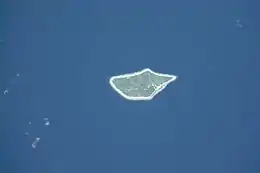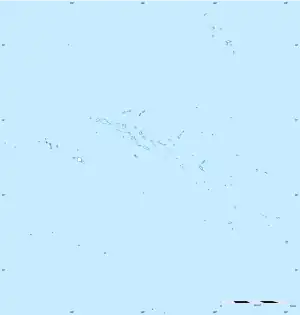Tikei
Tikei, also known as Manu,[2] Tikai and Tiku is an island in the Tuamotu group in French Polynesia. Tikei is not a typical Tuamotu atoll, but a separate island. The island is 3.9 kilometres (2.4 miles) long, 1.6 kilometres (1.0 mile) wide, and has a land area of 4 square kilometres (1.5 square miles). Its highest elevation is 3 metres (9.8 feet) above sea level[3]
 NASA picture of Tikei Island | |
 Tikei | |
| Geography | |
|---|---|
| Location | Pacific Ocean |
| Coordinates | 14°57′S 144°33′W |
| Archipelago | Tuamotus |
| Area | 4 km2 (1.5 sq mi) |
| Length | 3.9 km (2.42 mi) |
| Width | 1.6 km (0.99 mi) |
| Highest elevation | 3 m (10 ft) |
| Administration | |
France | |
| Overseas collectivity | French Polynesia |
| Administrative subdivision | Tuamotus |
| Commune | Takaroa |
| Demographics | |
| Population | Uninhabited[1] (2012) |
Geographically Tikei is part of the King George Islands (Îles du Roi Georges) subgroup, which includes Ahe, Manihi, Takapoto, Takaroa and Tikei.
Tikei is uninhabited. There used to be human habitation and the main village was called Tereporepo. The closest land is Takapoto Atoll, located 73 km to the Northwest. Tikei Island has been poorly researched.
History
The first recorded European to arrive to Tikei was Dutch mariner Jacob Roggeveen on May 18, 1722. He named this island "Carlshoff".
Russian mariner Otto von Kotzebue came to Tikei in 1816. He named it "Romanzov", after the main sponsor of his expedition.
Administration
Tikei belongs to the commune of Takaroa, which consists of the island of Takaroa, the island of Tikei and the atoll of Takapoto.
See also
References
- "Population". Institut de la statistique de la Polynésie française. Retrieved 22 September 2014.
- Young, J.L. (1889). "Names of the Paumotu Islands, with the old names so far as they are known". The Journal of the Polynesian Society. 8 (4): 264–268. Retrieved 21 September 2014.
- Dahl, prepared by the International Union for Conservation of Nature and Natural Resources, Commission on National Parks and Protected Areas ; in collaboration with the United Nations Environment Programme; based on the work of Arthur Lyon (1986). Review of the protected areas system in Oceania (Sept. 1986. ed.). Gland, Switzerland: IUCN. p. 203. ISBN 2880325099.
{{cite book}}: CS1 maint: multiple names: authors list (link)